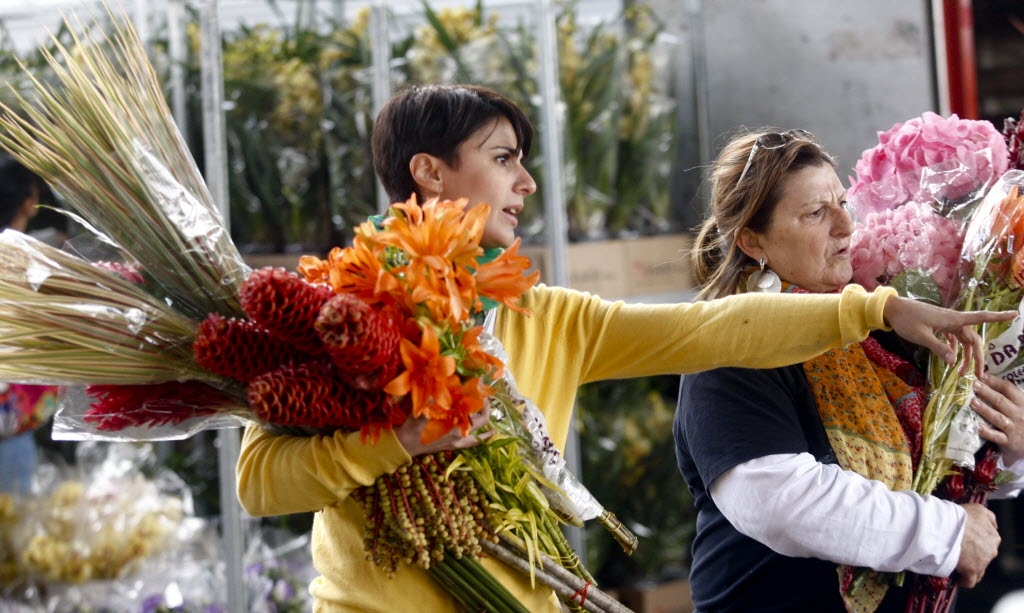Shops, restaurants, and even the Air Force have been preparing for the huge ‘Dia das mães’ rush in Brazil, a country where people love their mothers very much. Above, shopping for flowers this week in preparation.
By Dom Phillips
Foreigners living in Brazil can forget about meeting their Brazilian friends Sunday. It is Mother’s Day and that means the entire country is taking their mum out for lunch. Dia das Mães – as Mother’s Day is called – is big in many countries. But in Brazil, there is, quite simply, no avoiding it.
It’s one of those dates there is no arguing with – not unless you want the whole country lining up against you with a metaphorical rolling pin in hand.
“Here, it’s practically 100%,” a Brazilian friend explained. “There might be some crazy people who don’t, but pretty much everybody gets involved.”
It is sometimes said that Brazil is a patriarchal, macho society, and in many ways it is. But it also has a strong matriarchal culture. People generally live at home until they get married. Boys are raised by mothers who tell them the whole time that they are princes, that they are wonderful, that they are strong and handsome and that they will run the world. No wonder they cling to that bond as men.
From criminals to footballers, if one person has the last word, it’s mum. It does not matter how big, rich or powerful the man is: if his mother claps her hands, he will jump in the air. Brazilian soccer great Ronaldo is not the only footballer to have taken his mum along when he moved to Europe.
Geuse Galera, mother of footballer Roger Flores, recently offered up her comments on the high profile separation of her son from actress Deborah Secco. As is often common, both parties were rapidly seen with other people – Secco with religious singer Allyson Castro, and Flores with model and volleyball player Betina Schmidt (a two-pronged job description that perhaps only makes sense in Brazil).
Flores’s mum had good advice, as mums generally do. “I always say he has to see the other side as well, because he has two sisters. To not do to others what he would not like to be done to his sisters.”
There is also the Catholic influence – Mary the Mother of God being of particular importance in the church, still Brazil’s primary religion. Though, the country does have its other religions in which female deities are prominent, such as Yemanjá, a female sea goddess in the Afro-Brazilian religions of Candomblé and Umbanda. Every February 2, people in Bahia and Rio de Janeiro crowd beaches to make offerings of flowers and champagne to Yemanjá and make wishes. Pictures of her hovering above the waves are almost as popular as those of the Madonna.
Brazil also has an increasing number of strong women in positions of power. Top of the tree is the president, Dilma Rousseff, who has one grown-up daughter, has described herself as the ‘mother of Brazil’ and has even said that she takes care of the country’s economy much like a woman takes care of household bills.
A discourse that brought to mind Margaret Thatcher, another politician-mother, whose recent death made front page news in Brazil. Like Thatcher was, Rousseff is notoriously tough on ministers who aren’t on top of their briefs.
It used to be said of Thatcher that her private-school educated ministers, generally raised in Britain’s ‘old boy network’, as the country’s aristocratic elite is known, responded to her nanny-ish tones because they were all raised by their nannies. Do Rousseff’s underlings jump at her commands because they remember their mothers scolding?
Either way, on Sunday Brazil’s millions of mothers will get whatever they want. “Mothers don’t want to do anything in the house, no cooking, nothing, they want to eat out. So all the restaurants are a full,” my friend explained. She will of course be lunching with her mother on Sunday.
Restaurants have been bracing themselves for Sunday’s Mothers Lunch frenzy. Rio’s O Globo newspaper offered a guide to restaurants with special Mother’s Day menus. What is a perfect Mother’s Day lunch? Spaghetti with shitake mushrooms and prawns in herb butter, for R$42 at Terra Brasilis.
The Brazilian Air Force even offered cream and powders in a competition to those who sent in photos of their mothers. The prizes will come from the Air Force’s own compounding pharmacy, in Guaratinguetá, the Sonia Racy column for the Estado de São Paulo newspaper site explained. Racy did helpfully explain that the Brazilian Air Force pharmacy has saved it R$6.5 million over 15 years cause it can make its own drugs. Just in case you were wondering.
Research agency Euromonitor offered up its Ten Facts About Mothers, garnered from research in eight markets – including Brazil. As you might expect, this was consumer-based. “Mothers in emerging markets especially enjoy learning about new products (trying new products, browsing shopping malls), compared to mothers in developed markets,” for instance.
Yes, it’s a massive cash-in for retailers. Anything that can possibly be given a Mother’s Day hook in advertising will be. Brazilian mothers have clearly grasped this. Apparently they increasingly opt for electronic goods as presents. According to a survey of 1,300 mothers in Brazil, Colombia, Venezuela and Uruguay reported by the G1 site, the most popular is a tablet.
That’s the hand-help computer kind, by the way, not the stereotypical housewife’s Valium…


